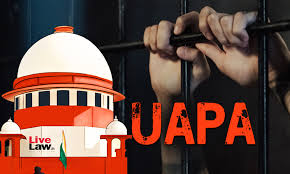A terror accused facing trial under the stringent provisions of the Unlawful Activities Prevention Act (UAPA), 1967, can be released on bail if the trial moves at a snail’s pace, the Supreme Court has ruled.
In April 2019, the top court had set aside the bail granted to Kashmiri Zahoor Ahmad Shah Watali by the Delhi High Court in a terror funding case filed against him by the National Investigation Agency (NIA).
In Watali’s case, it had held that bail in UAPA cases couldn’t be granted if there was a prima facie satisfaction of the court that the material on record proved the allegations and that it was not permissible for courts to engage in a detailed analysis of prosecution case and to weigh the material before it while considering the bail. However, a Bench of Justices JB Pardiwala and Ujjal Bhuyan on Thursday said, “This decision i.e. Zahoor Ahmad Shah Watali has to be read and understood in the context in which it was rendered and not as a precedent to deny bail to an accused undertrial suffering long incarceration with no end in sight of the criminal trial.”
The Bench ordered the release of accused Sheikh Javed Iqbal, alias Ashfaq Ansari, alias Javed Ansari, who was arrested by the Uttar Pradesh Police on February 23, 2015, for allegedly engaging in the illegal trade of supplying counterfeit Indian currency notes in Nepal. “We are of the considered view that continued incarceration of the appellant cannot be justified,” it said, setting aside the April 3, 2023, Allahabad HC order that denied him bail.
Noting that the appellant was in custody for more than nine years and evidence of only two witnesses had been recorded, the Bench said: “In such circumstances, a reasonable view can be taken that the trial is likely to take considerable time.”
The Bench, however, ordered the trial court to impound Iqbal’s passport and/or citizenship document(s), and ensure that he does not leave the territorial jurisdiction of the trial court. The appellant was also asked to furnish his address to the trial court and appear before the trial court on each and every date of the trial.
“In addition to the above, the appellant shall mark his attendance before the police station which the trial court may indicate once in every fortnight till the conclusion of the trial. He shall not tamper with the evidence and shall not threaten the witnesses. If there is any violation of the bail conditions as above, it would be open to the prosecution to move the trial court for cancellation of bail,” it ordered.
For a person accused under the UAPA, getting bail is a difficult proposition for three reasons. Firstly, Section 43D(5) of the UAPA says that notwithstanding anything contained in the CrPC, no person accused of an offence punishable under Chapters IV and VI of the UAPA shall, if in custody, be released on bail or on his own bond, unless the public prosecutor has been given an opportunity of being heard on the bail application.
Secondly, the proviso to Section 43D(5) says that such accused person shall not be released on bail or on his own bond if the court on a perusal of the case diary or the final report (chargesheet) made under Section 173 CrPC is of the opinion that there are reasonable grounds for believing that the accusation against such person is prima facie true.
Thirdly, Sub-Section (6) of Section 43D further clarifies that the restrictions on grant of bail specified in Sub-Section (5) will be in addition to the restrictions under the CrPC or any other law for the time being in force on granting of bail.
However, the top court said, “In the given facts of a particular case, a constitutional court may decline to grant bail. But it would be very wrong to say that under a particular statute, bail cannot be granted. It would run counter to the very grain of our constitutional jurisprudence.”


